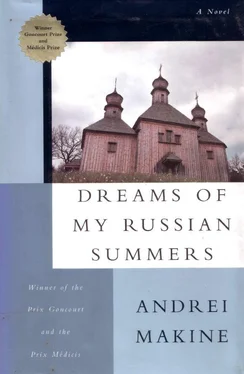I wanted to tell Charlotte that that kind of literature was dead in France. And that in the multitude of books I had devoured since the start of my reclusive life as a writer, I had looked in vain for one that I could imagine in her hands in the middle of a Siberian izba . Yes, the book open, a little gleam of tears in her eyes…
In those imaginary conversations with Charlotte I became an adolescent again. My youthful extremism, long since quenched by the realities of life, was awakened. Once again I sought an absolute, unique work. I dreamed of a book that could remake the world with its beauty. And I heard my grandmother's voice responding to me, understanding and smiling, as in the old days at Saranza on her balcony: "Do you still remember those tiny apartments in Russia that groaned under the weight of books? You know, books under the bed, in the kitchen, in the hall, piled right up to the ceiling? And those unobtainable books that you were lent for one night and which you had to give back at six o'clock sharp in the morning? And yet others, retyped, with six carbons at the same time; they gave you the sixth copy, almost illegible, or 'blind,' as they called it… You see, it's difficult to compare. In Russia the writer was a god. The Last Judgment and the Kingdom of Heaven were expected from him at the same time. Did you ever hear anyone there talk about the price of a book? No, because books had no price! You could go without buying a pair of shoes and freeze your feet in winter, but you bought a book…"
Charlotte's voice broke off, as if to give me to understand that this cult of the book in Russia was only a memory now.
"But the unique book, the definitive book. Judgment and Kingdom at the same time?" exclaimed the adolescent I had once more become.
My feverish whisperings jerked me out of my invented conversation. Ashamed, like someone who has been caught talking to himself, I saw myself for what I was. A man gesticulating in the middle of a little dark room, where a blind window faces onto a brick wall and needs neither curtains nor shutters. A room that can be crossed in three steps, where objects, for lack of space, crowd together, encroach on one another, become entangled: old typewriter, electric stove, chairs, shelves, shower, table, spectral clothes hanging on the walls. And everywhere sheets of paper, bits of manuscripts and books, which give this cluttered interior a kind of highly logical madness. Outside the window the start of a wet winter's night, and – floating up from the maze of ancient houses – an Arabic melody, a mixture of lament and celebration. And the man is dressed in an old light-colored overcoat (it is very cold). On his hands he wears mittens, necessary for typing in the freezing room. He is talking to a woman. He addresses her with that confidence that one does not always have, even for the intimacy of one's own voice. He is questioning her about the unique, definitive work, without fear of seeming naive or ridiculously pathetic. She is about to reply to him…
Before I went to sleep, I had the thought that in coming to France, Charlotte would seek to understand what had happened to that literature from which a few old books represented for her, in Siberia, a miniature French archipelago. I imagined coming into the apartment where she would be living one evening and seeing on the edge of a table or the windowsill a book open, a recent book, which Charlotte was reading in my absence. I would lean over the pages, and my gaze would fall on these lines:
It was, in fact, the mildest morning of that winter. The sun shone as in the first days of April; the hoarfrost was melting, and the wet grass glistened, as if drenched with dew… I had spent this unique morning reviewing a thousand things, with an ever-increasing melancholy beneath the clouds of winter – I had forgotten the old garden and the cradle of vine, in whose shadow my life had been decided… How to live in the image of this beauty? that is what I should like to learn. The clarity of this country, the transparency, the profundity, and the miracle of this meeting of water, stone, and light – that is the only knowledge, the first morality. This harmony is not illusory. It is real, and faced with it, I feel the necessity of the word…
The blissful disappearance of routine is something young betrothed couples on the eve of their wedding, or people who have just moved house, must have a sense of. It feels to them as if the few days of celebration or the happy chaos of settling in will last forever, becoming the very stuff of their lives, light and sparkling.
During my last weeks of waiting I lived in a similar intoxication. I left my little room, and rented an apartment I knew I could only afford for four or five months. That was of scant importance to me. From the room where Charlotte would live one could see the blue-gray expanse of roofs reflecting the April sky… I borrowed what I could; I bought furniture, curtains, a carpet, and the household paraphernalia that I had always dispensed with in my previous dwelling. The flat as a whole remained empty; I slept on a mattress. Only the room destined for my grandmother now had a habitable air.
And as the month of May drew closer, so my cheerful recklessness and my spendthrift madness increased. From secondhand shops I began buying small antique objects that might, as I saw it, give a soul to this rather ordinary looking room. At an antique dealer's I found a table lamp. He lit it, to give me a demonstration; I pictured Charlotte's face by the light of its shade. I could not leave without that lamp. I filled the shelves with old leather-backed volumes of illustrated magazines from the turn of the century. Each evening I spread out my trophies on the round table that stood in the middle of this decorated room: half a dozen glasses, an old bellows, a pile of ancient postcards…
In vain I told myself that Charlotte would never want to leave Saranza, and above all Fyodor's grave, for long, and that she would have been as comfortable in a hotel as in this improvised museum: I could no longer stop myself buying and adding finishing touches. For even when initiated into the magic of memory, the art of recreating a lost moment, man remains overwhelmingly attached to the physical fetishes of the past: like that conjurer whom God blessed with the gift of working miracles, but who preferred the nimbleness of his own fingers and his suitcases with false bottoms, which had the advantage of not upsetting his common sense.
And I knew that the real magic would be revealed in the bluish reflection of the roofs, in the aerial fragility of the skyline outside the window that she would open on the day after she arrived, very early in the morning. And in the sound of the first words that she exchanged in French with someone on a street corner…
On one of the last evenings of my waiting I caught myself praying… It was not a formal prayer. I had of course never learned one; I grew up by the skeptical light of an atheism so militant, it was almost religious in its tireless crusade against God. This was more a kind of dilettante and confused plea, whose addressee remained unknown. Catching myself red-handed in this unaccustomed act, I hastened to make a mockery of it. I thought that, given the impiety of my past life, I could have exclaimed, like that sailor in Voltaire's story, "I have trodden on the crucifix four times on four voyages to Japan!" I told myself I was a pagan, an idolater. Nevertheless these jibes did not banish the vague internal murmuring that I had become aware of deep within me. Its intonation had something childish about it. It was as if I were proposing a bargain to my unnamed interlocutor; I would only live another twenty years, well, fifteen years – all right, only ten – provided this meeting, these moments regained, were possible…
Читать дальше












